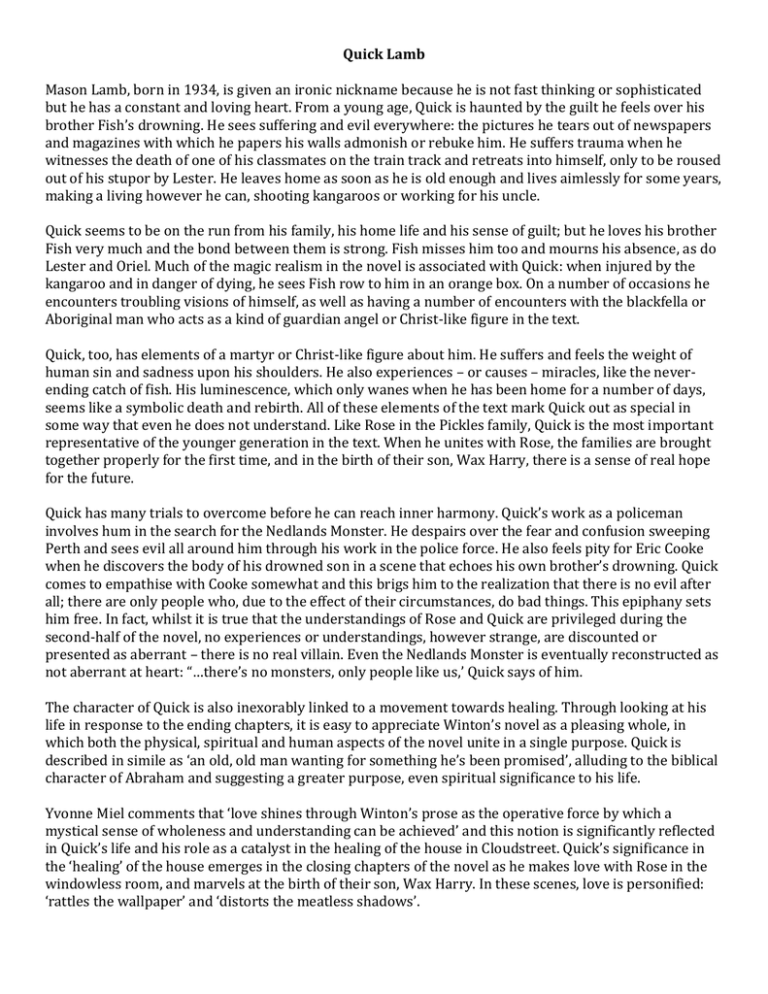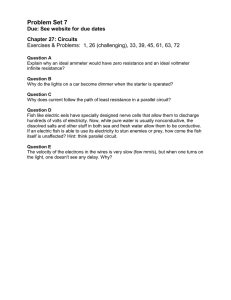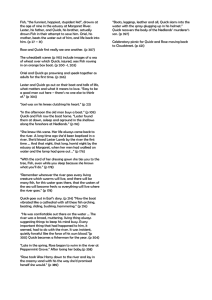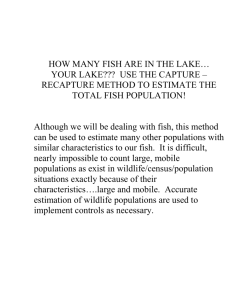7. 'Quick Lamb - WordPress.com
advertisement

Quick Lamb Mason Lamb, born in 1934, is given an ironic nickname because he is not fast thinking or sophisticated but he has a constant and loving heart. From a young age, Quick is haunted by the guilt he feels over his brother Fish’s drowning. He sees suffering and evil everywhere: the pictures he tears out of newspapers and magazines with which he papers his walls admonish or rebuke him. He suffers trauma when he witnesses the death of one of his classmates on the train track and retreats into himself, only to be roused out of his stupor by Lester. He leaves home as soon as he is old enough and lives aimlessly for some years, making a living however he can, shooting kangaroos or working for his uncle. Quick seems to be on the run from his family, his home life and his sense of guilt; but he loves his brother Fish very much and the bond between them is strong. Fish misses him too and mourns his absence, as do Lester and Oriel. Much of the magic realism in the novel is associated with Quick: when injured by the kangaroo and in danger of dying, he sees Fish row to him in an orange box. On a number of occasions he encounters troubling visions of himself, as well as having a number of encounters with the blackfella or Aboriginal man who acts as a kind of guardian angel or Christ-like figure in the text. Quick, too, has elements of a martyr or Christ-like figure about him. He suffers and feels the weight of human sin and sadness upon his shoulders. He also experiences – or causes – miracles, like the neverending catch of fish. His luminescence, which only wanes when he has been home for a number of days, seems like a symbolic death and rebirth. All of these elements of the text mark Quick out as special in some way that even he does not understand. Like Rose in the Pickles family, Quick is the most important representative of the younger generation in the text. When he unites with Rose, the families are brought together properly for the first time, and in the birth of their son, Wax Harry, there is a sense of real hope for the future. Quick has many trials to overcome before he can reach inner harmony. Quick’s work as a policeman involves hum in the search for the Nedlands Monster. He despairs over the fear and confusion sweeping Perth and sees evil all around him through his work in the police force. He also feels pity for Eric Cooke when he discovers the body of his drowned son in a scene that echoes his own brother’s drowning. Quick comes to empathise with Cooke somewhat and this brigs him to the realization that there is no evil after all; there are only people who, due to the effect of their circumstances, do bad things. This epiphany sets him free. In fact, whilst it is true that the understandings of Rose and Quick are privileged during the second-half of the novel, no experiences or understandings, however strange, are discounted or presented as aberrant – there is no real villain. Even the Nedlands Monster is eventually reconstructed as not aberrant at heart: “…there’s no monsters, only people like us,’ Quick says of him. The character of Quick is also inexorably linked to a movement towards healing. Through looking at his life in response to the ending chapters, it is easy to appreciate Winton’s novel as a pleasing whole, in which both the physical, spiritual and human aspects of the novel unite in a single purpose. Quick is described in simile as ‘an old, old man wanting for something he’s been promised’, alluding to the biblical character of Abraham and suggesting a greater purpose, even spiritual significance to his life. Yvonne Miel comments that ‘love shines through Winton’s prose as the operative force by which a mystical sense of wholeness and understanding can be achieved’ and this notion is significantly reflected in Quick’s life and his role as a catalyst in the healing of the house in Cloudstreet. Quick’s significance in the ‘healing’ of the house emerges in the closing chapters of the novel as he makes love with Rose in the windowless room, and marvels at the birth of their son, Wax Harry. In these scenes, love is personified: ‘rattles the wallpaper’ and ‘distorts the meatless shadows’. In ‘Country’, Lester and Oriel discuss Quick and his return to Cloudstreet after a two year absence: ‘The colour of his skin in strange, like mother of pearl or changes at every angle but somehow riddled with rainbows that catch at the edge of vision. He’s cool to touch and sweet smelling the way a man rarely is’ (p.229). Quick’s return prompts the Lambs to take stock, and they produce a number of identifying positions, if only to identify instability. Of Quick’s strange glowing, a fluorescence caused by a vision while fishing on the Margaret River, Lester ventures the speculation that Quick is displaced (like his visionary brother, Fish), that he ‘looks like he’s gone someplace else.’ His ultimate response to the fact that his son is fabulously ‘lit up like a beacon’ (p.231) is to reflect on his own disorientation: ‘I just wish I knew what to believe in.’ (p.229) Quick, the inarticulate working-class boy and man, is Cloudstreet’s central visionary character. Quick’s guilt about his brother’s accident generates richly imaginative visions of suffering that make him an outsider with inexplicable visions and remarkable aim: ‘There was nothing exceptional in his but for the fact that he could never seem to be ordinary. He had some mark on him, like a migrant, or a priest. You could tell he was trying with you, trying to fit.’ (p.213) Quick’s visions provide fascinating material for themes such as home and displacement – his fabulist ‘waking dreams’ are a vital part of the epic theme of being lost, and integral to the rites of passage and acquisition of knowledge that follow his escape from Cloudstreet and his eventual return to his family and his brother-child. The first of Quick’s waking dreams occurs on the Swan River in Perth. Lester asks Quick to row the family’s new boat home, and he undertakes this mammoth task with Fish. At the point of complete exhaustion he stops rowing, and Fish states, ‘I can hear the water’ (p.113). By this, Fish does not mean the sounds of the river. An important distinction between ‘the water’ and the literal river or sea is made in this episode. As Fish also refers to the Western Australian wheatfields as ‘the water’, it is clear that he means the transcendent element of which he had such a brief acquaintance near death, and to which he longs to return. As the brothers sing to keep awake, the boa somehow leaves the river and enters ‘the water’ realm that Fish recognizes, and navigates: ‘Quick opens his eyes to see Fish standing up in the middle of the boat with his arms out like he’s gliding, like he’s a bird sitting in an updraught’ (p.114). Fish has become birdlike – ‘The water. The water. I fly.’ (p.114) The brothers’ experience of infinitude and wholeness, ‘the water’, ends with their return to the river, and Quick comforting Fish like a baby, who is anguished at the repeated loss of ‘the water’. The impossible journey handed to Quick by his father is a precursor to Quick’s later flight from Cloudstreet as a masculine rite of passage to maturity. This involves separation from the maternal and from home, and an eventual return with wisdom for the community – whilst this is also true of Rose Pickles, whose journey is particularly ‘masculine’, Quick’s experiences are harsher, more self-destructive, yet punctuated with a series of visions he barely understands and cannot articulate. While Quick is roo-shooting in the West Australian wheatfields, he experiences a waking vision in which Fish, rowing an orange crate with a tomato stake across the sky above him, call Quick to the river, to fishing and to come home (p.200-203). This ‘vision’ repeats the doubling of sea and sky from the Swan River – Quick once again bolts from Fish and ends up, through the fabulist agency of the ‘blackfella’, working for Earl in the Margaret River, the scene of his childhood. ‘For a year or so Quick thought he had a hold of himself’ and ‘he thought he was coping’ but in fact, ‘he was miserable, lost, drifting, tired and homesick as a dog’ (pp.212-213). See notes on ‘religious symbolism’ regarding Quick’s experience with the passenger fish (pp. 217-218) The repetition of the ordinary picnic, that evokes the utopian vision of wholeness and community as well as narrating the final departure of Fish, parallels Quick’s return to and acceptance of his brother’s state through his ‘literal’ immersion in the doubled fish (or passenger fish). Quick cannot escape his brother because he cannot escape himself. The third important vision in Cloudstreet occurs in ‘Inland’ when Quick returns to the West Australian wheatbelt with Rose, Fish and Wax Harry. After a late conversation with Rose about participation in community, Quick wakes to see the ‘the moony light was coming off Fish himself’ (p.419). Fish is back in his water element, and the family, even Rose, witness naked children ‘rising from the ground like a mineral spring…familiar somehow in the multitude that grew to a vast winding expanse, passing them with a lapping sounds of feet’ (p.420). As the Fish-narrator later explains, the wheatfield children are lost children, like himself, returning to the sea ‘which will not fill with is for we came from it and return to it.’ This vision is a gift to ‘the man, the woman, the baby’ (p.420) from Fish to ameliorate his coming departure. Much of the novel’s important action – the scenes where the characters themselves understand something momentous is happening, or some new and deep connection between them is being realized – takes place on the river or its banks, particularly for Quick. he sees Fish, rowing in the orange box. It is on the river that Rose and Quick finally see one another, after years of living in the same house. It’s on the river that Quick and Fish make the journey that bonds them forever and it’s where important truths are spoken. Oriel and Quick go prawning and speak together as adults for the first time. Lester and Quick go out on their boat, ‘a whole river of time’ before the younger man, and the talk is of life, of what matters and of what it means to love. Revisit notes on the ‘Blackfella’ for more information about Quick’s connection to him. A few more notes on Quick’s guilt: Quick battles with the restrictive pressures of a masculinity that frequently leaves him incapable of expression. Tortured over feeling that he was responsible for Fish’s accident, Quick “picks up sadness like he’s got a radar for it.” (89) and constructs a bedroom wall of sorrow, a “gallery of the miserable” (61) plastered with newspaper pictures of refugees and prisoners of war. These images show that there are worse things in the world and reminds Quick that life could get worse at any time. They are also a reminder that he is a survivor which makes him feel guilty, they are a way for him to punish himself being “lucky and healthy… and his brother is not.” “…should’ve been him, not Fish” The guilt he feels over Fish’s accident consumes him and makes him feel like he doesn’t deserve good things in life: o “Quick thought of his room at Cloudstreet, the victim dancing on his wall, all the things there were to be stopped.” o “There’s someone out there killing and doing evil and he’s losing the fight with them, and day by day it gets him further into despair.” o “I used to see the saddest things, think about the saddest, saddest things. And those things put dents in me.” o “He was used to being sad” Quick’s inability to deal with his emotions sees him leave Cloud Street and to go bush. He becomes a kangaroo culler and in doing so learns “not to think much at these times, only to listen” (197). After being attached by a roo, Quick heals, but on a subsequent culling expedition sees a vision of himself “a man running raw and shirtless in the night… tough with fear” (204), coming towards him. Stunned by what he has seen and unable to explain it in rational terms, Quick flees. Quick – chapter references: - Fish Lamb Comes Back (p.25) The Dance (p.60) Tuba (p.73) Quick Lamb’s Sadness Radar (p.89) Debts (p.92) The River (p.107) Combustible Material (p.137) A Desertion (p.143) Down Among Them, Killing (p.195) Goanna Oil (p.201) Safety Off (p.203) The Florist Shop (p.205) Baulking At Shadows (p.210) Tho Mine Enemies Rail (p.212) Earl’s Dory (p.214) Load of Pigs (p.219) Morning (p.239) Ticking (p.265) Silhouettes (p.299) Hypotheticals, as the Smartbums Say (p.307) Dwellingplace (p.313) How Small Our Dreams Are (p.326) Flatfoot (p.331) Two Florins (p.339) The New House (p.361) Home (p.368) Morning (p.372) Slipping (p.378) The Past (p.396) Floater (p.397) Turning (p.401) Inland (p.412) Spaces (p.417)




